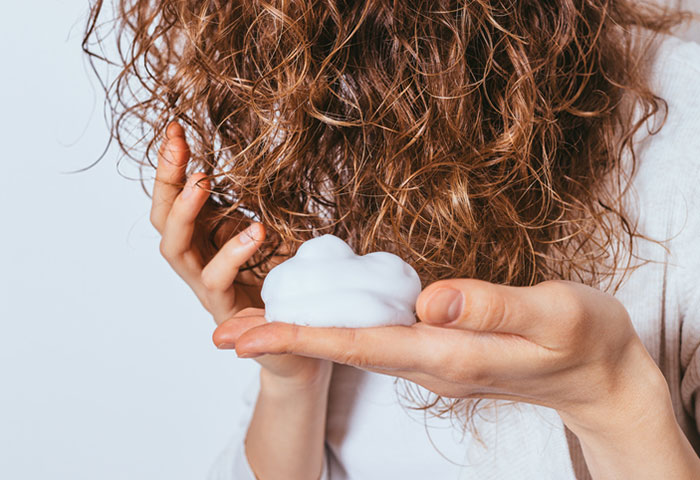
GETTY IMAGES
Although you may not have noticed, many of your favorite curly hair products likely contain some form of alcohol, the most common often being Cetearyl alcohol. Which can feel counterintuitive since alcohols are often thought to be drying and bad for your hair – but that’s not always the case.
While that may give you pause, the term “alcohol” simply refers to the chemical compound of a specific structure. In this case, a carbon atom with one or more hydroxyl (―OH”> groups attached to it. So when it comes to your hair care, you might be surprised to find that they actually can serve an important purpose.
That being said, while Cetearyl alcohol is definitely beneficial for your hair when used in shampoos and conditioners, you never want to use a product that lists cetearyl alcohol as the first ingredient. This is because the order ingredients are listed in on a label actually has a meaning behind it: the first ingredient is the most abundant while the last ingredient is included in the smallest quantity.
So what this means for you and your hair is that you should always double check the bold “special” ingredients in a product before purchasing or using it. Because you may find it listed lower in the ingredient list than you’d like. Vice versa, there can be ingredients like Cetearyl alcohol that while beneficial, shouldn’t be listed too close to the top.
What is Cetearyl Alcohol?
Cetearyl alcohol is a long chain, fatty alcohol that adds an emulsifying agent to many hair care products and can help your hair feel smoother with less frizz. Long chain alcohols are oilier than short chain alcohols thanks to their abundance of carbon atoms in each molecule (between 12 and 20″>. Made from a combination of Cetyl alcohol and Stearyl alcohol, Cetearyl alcohol can be naturally sourced from plants or synthetically created.
While the ingredient section may list it by name, Cetearyl alcohol can also be referred to as:
- alcohols C1618
- C16-18 alcohols
- (C16-C18″> alkyl alcohol
- cetyl/stearyl alcohol
- cetostearyl alcohol
Not All Alcohols Are Bad For Your Curls
When it comes to curly hair, in simplest terms short chain alcohols are bad and fatty alcohols are helpful to a point. But it’s a little more complicated than that. Short chain and long chain alcohols have different uses and functions, and are therefore found in different kinds of products. The alcohol in hair spray, for example, will likely not be the same one found in your conditioner and styling creams
Of course, you can also avoid alcohols altogether (if you prefer”> in both your cleansing and styling products as long as you’re careful to thoroughly read the ingredient label before purchasing. That being said, you likely won’t see the same or desired results.
Short Chain Alcohols
Short chain alcohols have their uses – you just might not want them included in all of your hair care products. These alcohols are the ones which evaporate quickly, often leaving your hair feeling dry. And unfortunately, they’re likely to be found in hair care products which claim to “cut down your drying time” (which can work in a hairspray, but not so much in a conditioner”>.
But they’re also known to whisk away moisture and natural oils as they dry, creating rough, frizzy, and even brittle hair. Which is absolutely the last thing you want for your curls. And remember, the higher up an ingredient is in the list, the higher its concentration is in a particular product. So while your hair may not show any adverse reactions to a shampoo, conditioner, or styling product when a short chain alcohol is listed near the bottom of the ingredients section, you should be cautious when using something with a larger “bad” alcohol content.
Some of the most common short chain alcohols found in hair care products include:
- Alcohol denat (Denatured alcohol”>
- Benzyl alcohol
- Ethanol alcohol
- Ethyl alcohol
- Isopropanol alcohol
- Isopropyl alcohol
- Propanol alcohol
Long Chain Alcohols (A.K.A. Fatty Alcohols”>
In comparison, long chain alcohols are often far more beneficial than short chain alcohols, but should still be used in moderation. This is because they have far more carbon atoms, making them oilier and “fatty.” When used in moderation they can help soften your curls and reduce the chances of frizz. Fatty alcohols, like humectants, can also draw moisture from the atmosphere to your hair to maintain hydration.
But mainly, they’re added to curl creams, conditioners, and other moisturizing products because they’re used as emulsifiers. In addition to Cetearyl alcohol, Cetyl alcohol, Lauryl alcohol, Stearyl alcohol, and Myristyl alcohol are three of the most common “good” fatty alcohols you’re likely to find in curly hair products.
What It Means To Be An Emulsifier
In large part, alcohols are included in various moisturizing products because of their emulsifying properties. And fatty alcohols specifically are chosen because they are also moisturizing and nourishing when used in moderation.
An emulsifier is something that keeps liquids and oils from separating, and it’s extremely beneficial in curly hair care products which more often than not contain a combination of both. Which is part of what makes Cetearyl alcohol so important. Not only does it help to smooth and soften your hair, but it also keeps your products mixed together.
Read next: The Trick to Reading the Label On Curly Hair Products
